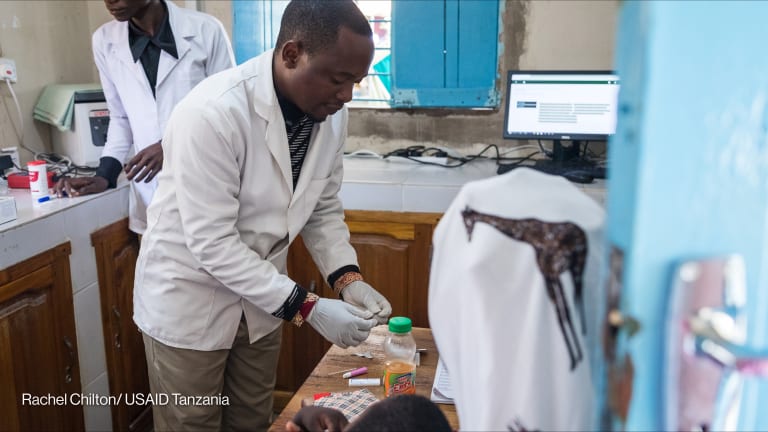
Future gazing is tempting. In 2013, the global health community talked a lot about the future. We debated what would happen in 2015 and beyond — about how we would secure sustainable development, and how health would play an integral part in that.
In 2014, we need to focus on the here and now. If we’re to cement the progress already made in helping people live healthier lives — regardless of where they live — we must start making last year’s conversations a reality.
From the conversations I had last year at places like the U.N. General Assembly, I think there are five ways in which we can accelerate global health in 2014.
Put partnership into practice
Partnership was a predominant theme throughout development discussions last year and we’re already starting to see collaboration in action. Businesses and not-for-profits are forging innovative tie-ups that meet a particular need, and demonstrate a new way of working that strikes a balance between business and philanthropy.
Uniting the financial and intellectual capital of the private sector with the deep knowledge of nongovernmental organizations can help clear the nexus of challenges that compromise health. As long as these collaborations are focused and transparent and have measurable goals, they can generate genuine change.
In 2014, we need to progress these partnerships and show they can deliver tangible results.
Fight HIV, AIDS and malaria
Working together has already helped the global health community secure significant gains in the battle against malaria and HIV.
Since 2000, efforts to control and eliminate malaria have saved an estimated 3.3 million lives. Innovative models such as the Medicines Patent Pool are working to increase access to HIV medicines. But, concerted action is needed this year and beyond to maintain this momentum.
We must redouble our efforts to enhance our toolbox of preventions and treatments. In 2014, GlaxoSmithKline plans to file its malaria vaccine candidate for regulatory approval. It is intended to complement existing measures to fight malaria such as bed nets.
But the work doesn’t stop there. If we’re to keep diseases such as malaria, HIV, AIDS and tuberculosis at bay, organizations must continue working individually and in collaboration to develop fresh interventions.
Manage noncommunicable diseases
While we are beginning to gain a foothold in the fight against the big three diseases, another threat is emerging. As lifestyles change in the developing world, noncommunicable diseases such as diabetes and cancer are on the rise. More than half of all cancers and cancer deaths in 2012 occurred in less developed regions.
This is challenging, but already, innovative and entrepreneurial methods of managing such conditions are appearing. Take India’s CARE hospitals, which are focused on providing services in fields such as cardiology at an affordable price.
We’ll need to meet the challenge of managing NCDs in a climate where resources are getting tighter. Therefore, we must consider how to scale up these new models and adapt them to different geographies and income, as well as support training of more specialist practitioners.
Support innovation in developing countries
Increasingly, health care innovation is being driven by developing countries. Unburdened by established practices, they are developing interventions that meet their own needs. For instance, Malawi has developed a low-tech device to help babies with breathing difficulties; it costs a fraction of similar devices in the developing world.
This trend is set to continue; these emerging innovators must be supported and developed this year and in future. Awards that give them the recognition and resources they require to scale up could be the answer. Initiatives like “seed funding” could also give these ideas the springboard they need to help save many more lives.
Get on the phone
Central to much of the innovation we’re seeing in developing countries and beyond is technology, especially the mobile phone. This can help bring health care to even the most hard-to-reach areas.
Front-line health workers — who are so integral to improving access to health — can use mobiles to access support and information, as well as collect patient details. Mobiles can also be used to send patients information, advice and reminders to go for checkups or vaccinations.
For example, Vodafone and GSK are exploring how to use mobile technology to increase vaccination coverage in Mozambique through supporting health workers and improving record keeping. If used to its full potential, the simple mobile could help transform health.
Technological evolution also presents us with another innovation that could make a big difference to global health in 2014 and beyond: big data.
The potential offered by this wealth of information is profound. If used carefully, it could give us a better insight into the journey of disease across different regions, antibiotic resistance or the uptake of treatment. All this could help us better tailor cost-efficient and effective health care interventions to different environments.
But, this strays into future gazing again. While we must explore innovative ways to address emerging challenges, we must not forget the work that needs doing on the ground now. For example, the fight to eradicate polio is not won yet — as recent outbreaks remind us.
We must maintain our focus on these challenges as well as look to the future. It is a tall order. But by building on our progress so far, by applying the lessons we have already learned, we can make 2014 the year in which global health takes another leap forward.
Join the Devex community and access more in-depth analysis, breaking news and business advice — and a host of other services — on international development, humanitarian aid and global health.








